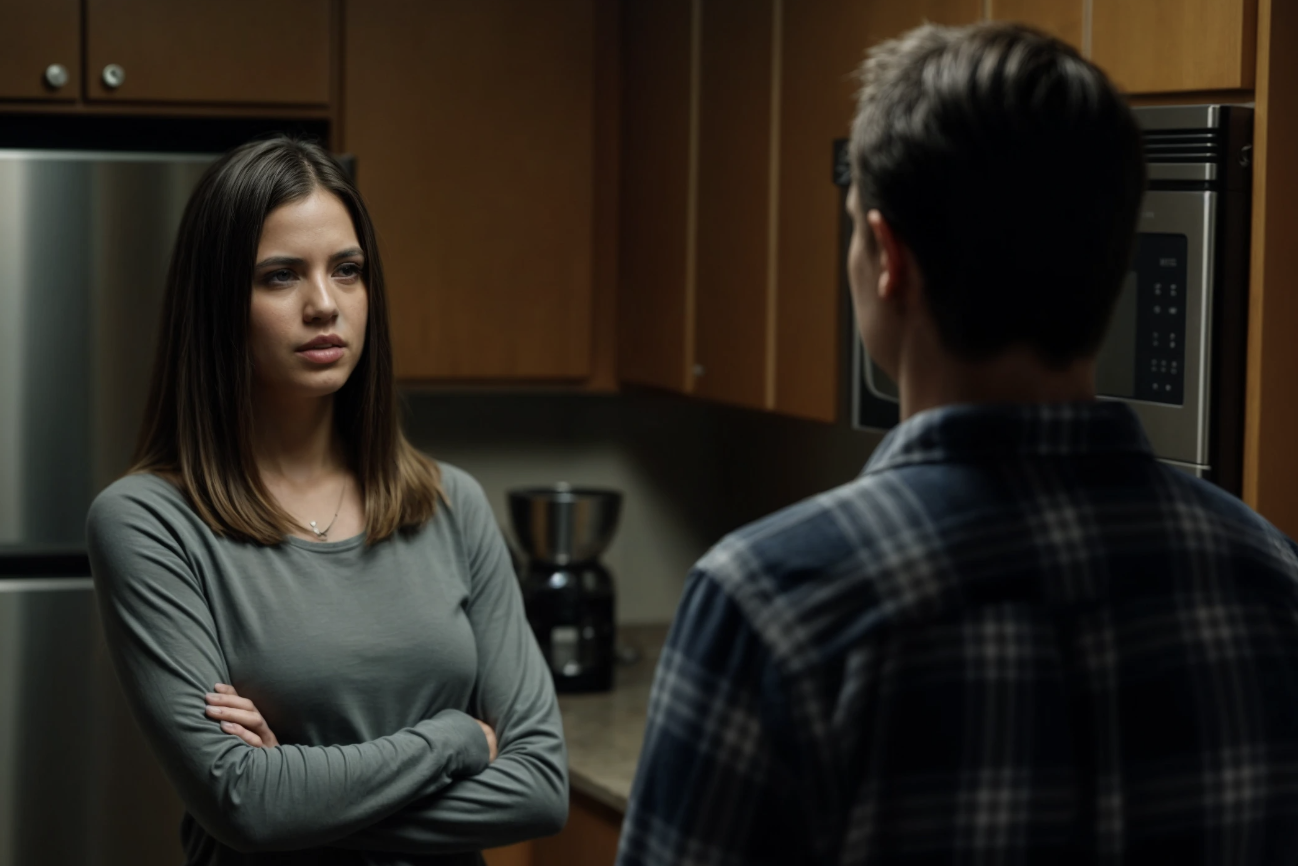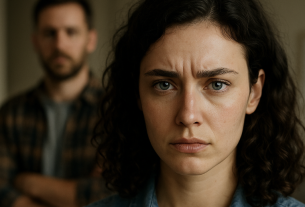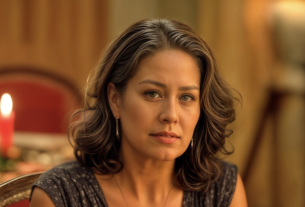Anya, get up. Mom’s pipes need painting, I bought the paint,” Kirill’s voice, brisk and annoyingly businesslike, broke the morning silence of the bedroom. He stood in the doorway, already dressed in jeans and a T-shirt, radiating the scent of shower gel and self-satisfaction. A bunch of keys swung in his hand as if he were a foreman giving orders to a crew, not a husband speaking to his wife.
Anna didn’t answer. She simply opened her eyes and looked at the ceiling. This was already the tenth time in less than a month their day had begun not with the smell of coffee or shared plans, but with another task from the “headquarters” their apartment had become. The “headquarters for pre-sale preparation” of Galina Ivanovna’s two-room flat — a project Kirill enthusiastically dumped onto her, Anna’s, shoulders.
She slowly, with some detached grace, threw back the blanket. No hurry, no fuss. Her movements were deliberate and precise, like someone who had made a decision and now was just following an inner script. Silently, she passed her husband, who watched her in confusion, and disappeared into the bathroom. Kirill shrugged and went to the kitchen, already looking forward to his well-deserved rest. Mentally, he was making plans to meet friends while his ever-reliable wife inhaled paint fumes for the sake of what he considered the common good.
When Anna entered the kitchen, Kirill was already sprawled on the small couch with his phone in hand. On the table stood a can of harsh-white paint and a new brush in a cellophane wrapper — a clear illustration of her day ahead. Anna ignored both him and the paint. She took her favorite cup from the cupboard, filled the coffee machine with beans, and started the brewing program. The room filled with the thick, sharp aroma of freshly brewed espresso.
“What are you poking around for?” Kirill asked lazily, not taking his eyes off the screen. “Mom’s already waiting. I told her you’d come this morning.”
Anna took the cup, sipped a little, savoring the bitter, scorching taste. She set the cup down on the countertop and only then turned to her husband. Her face was completely calm, even peaceful. And that calmness was more terrifying than any scream.
“Kirill,” her voice was even and quiet, but it cut through the morning silence like a scalpel.
Kirill looked up from his phone and stared at her. There was something new in his wife’s gaze — steel, something he hadn’t seen before.
“What?”
“I am your wife, not your mother’s personal assistant! If you send me to her one more time, this marriage will end just like your life in my apartment!”
Kirill froze. He looked at her, and his brain refused to process what he’d heard. It felt like a program glitch. He expected anything: persuasion, tired sighs, maybe even a petty argument — but not this cold, precise ultimatum.
“Are you… out of your mind?” he finally blurted, putting his phone aside. His face slowly flushed. “You have no conscience! You don’t respect my mother! We’re doing this for her, for our family!”
Anna took another sip of coffee. She didn’t raise her voice or argue. She simply watched him like a scientist observing a chemical reaction in a test tube.
“Doing this, huh?” She raised an eyebrow slightly. “Peeling off wallpaper soaked with decades of someone else’s life — that was me. Hauling bags of junk down from the attic while you were ‘handling business’ with your friends — me again. Washing windows that hadn’t seen a cloth since the first Olympics — also me. And you, Kirill, were lying right here on this very couch resting. Your ‘effort’ was buying paint and waking me up early.”
She finished her coffee, rinsed the cup, and placed it in the drying rack. Every movement was demonstrably calm. Then she looked at the clock on the wall.
“You have two hours. You can spend them going to your mother’s and starting to paint the pipes. Or you can spend them finding another place to live. Time starts now.”
With that, she left the kitchen, walked to the living room, sat in her favorite chair by the window, and opened a book she hadn’t finished in six months. Her entire demeanor showed the conversation was over. For her, he no longer existed in that room.
Kirill jumped up from the couch. His face turned crimson. He opened his mouth to unleash a torrent of accusations about selfishness, ingratitude, and coldness. He wanted to yell, to prove he was right, but when he met her icy, utterly detached gaze fixed on the book, he shut up mid-sentence. Suddenly, he realized yelling would be pointless. She had built a wall between them, and that wall was stronger than concrete. In powerless rage, he grabbed his jacket from the coat rack, shoved his feet into sneakers, and stormed out of the apartment. He had to show her who was boss. He had to come back with reinforcements.
The smell of the old apartment hit his nose as soon as Kirill turned the key in the lock. It was a thick, un-ventilated mixture of dust, dried wood, and something vaguely medicinal. The smell of his childhood and, as he now realized, the source of his current problems. Galina Ivanovna met him in the hallway, already in her usual floral housecoat but with hair perfectly styled for a Saturday morning. Her gaze was sharp and assessing. She scanned her son, instantly reading his state.
“What happened? You look terrible,” she said instead of greeting him, letting him in.
Kirill entered the kitchen, cluttered with stacks of old newspapers and some cans, and sank heavily onto a stool that creaked under his weight. He hadn’t come here to work. He had come to his main headquarters, to his only true ally.
“She refused,” he exhaled, staring at the peeling linoleum. “Can you believe it? She just refused to come. Made a scene.”
Galina Ivanovna silently put the kettle on the stove. She didn’t fuss or gasp. She acted like an experienced investigator who lets the suspect talk to piece together the bigger picture. She poured filtered water into a cup, added some tea leaves, and slid it over to her son.
“Tell me everything,” her voice was calm, but you could feel steel beneath it.
And Kirill started talking. In his version, he was the hero caring for his mother and the family’s future, and Anna was a rebellious selfish woman who didn’t appreciate his efforts. He vividly described buying the paint, politely waking her, and how she met his concern with icy silence and an unfair ultimatum. Of course, he omitted that in the past month he hadn’t lifted a finger to help and that his wife had done all the dirty work. In his world, those details didn’t matter. The main fact was her rebellion.
“She said you’re her mother, not mine, and that she’s not your assistant,” he finished bitterly. “And that if I ask her again, she’ll kick me out of her apartment. Her apartment! Can you imagine?”
Galina Ivanovna sipped her tea. The kettle whistled quietly on the stove. She stared at a wall where you could barely make out the outline of a long-removed calendar. Her face showed no anger or offense. It expressed the deep thought of a strategist assessing a changed battlefield.
“I see,” she finally said, the word heavier than any angry tirade. “She didn’t refuse you, son. She told me my place. Like I, with my apartment and my pipes, was interfering with her happy life.”
She expertly shifted the emphasis. Now it was no longer a quarrel between husband and wife over chores. It was Anna’s personal attack against her, Galina Ivanovna. Kirill immediately seized the idea. He felt better. Now he wasn’t just a husband ignored; he was a son defending the honor of an insulted mother.
“That’s exactly what I told her! That she doesn’t respect you! And she’s sitting there reading a book like I don’t exist!” His voice began rising again.
“Of course, you’re right,” Galina Ivanovna said softly but firmly. She stood up and turned off the kettle. “But yelling at her is useless. That’s exactly what she wants. For you to look like a hysterical fool and for her to be the calm, reasonable queen. You have to act differently.”
She looked at her son intently. There was no motherly pity in her eyes. There was cold calculation. Selling this apartment was her goal, her project to improve her life. Anna had gone from a useful tool to an obstacle. And obstacles must be removed.
“We’re going to her. Now,” she decided. “Together. And we’ll talk.”
Kirill blinked in confusion.
“Why? She’s…”
“Because one thing is to say that to you alone, in your apartment. Another is to say it to me to my face. In the presence of her own husband. Let’s see if she has the nerve.”
Her plan had flawless, cruel logic. They would come together. United front. She — as the unjustly offended elderly woman. He — as her loyal defender. They would corner Anna not with shouting, but with the very fact of their joint presence.
Kirill felt a surge of strength. The fog of confusion in his head cleared, replaced by anticipation of just revenge. He was no longer alone. He had a commander, and they had a plan. He straightened his back.
“Let’s go,” he said firmly.
Galina Ivanovna nodded and leisurely headed to change from her housecoat into battle attire — a strict dress and cardigan. She wasn’t preparing for reconciliation. She was preparing for invasion.
The doorbell rang exactly one hour and twenty minutes later. Sharp, demanding, it was designed to startle, unsettle, and force someone to rush to open. Anna didn’t flinch. She finished the page she was reading, carefully placed a bookmark, and set the book on the armrest of her chair. She knew who was there. And she knew he wouldn’t be alone. This predictability deprived their visit of any surprise, turning it from drama into a rehearsed, albeit rather lousy, play.
She calmly approached the door and looked through the peephole. As expected, next to Kirill’s flushed, righteously angry face, stood Galina Ivanovna’s stern, tight-lipped expression. She wore her best “battle” dark cherry dress and stared straight ahead as if posing for a portrait of a grieving but unbowed mother. Anna silently turned the lock and opened the door.
She said nothing. Just stepped back into the hallway, allowing them in. This silent invitation disarmed more than any hostile shout. Kirill stepped inside first, looking like a master returning to restore order. Behind him, with the dignity of an offended duchess, came Galina Ivanovna. Anna smoothly, without a slam, closed the door behind them. The trap snapped shut. Only they didn’t realize it yet.
“Hello, Anechka,” Galina Ivanovna began as soon as they were in the living room. Her voice was laced with a carefully calibrated mix of sympathy and reproach. She appraised Anna from head to toe. “You look unwell. Tired, probably. Kirill and I worry about you.”
This was the first shot. A flank attack. An attempt to paint Anna as ill, exhausted, and therefore not fully capable of her decisions. Kirill immediately agreed, crossing his arms.
“I told you you’re wearing yourself out. See, mom came to support you. And you…”
Anna turned her calm, clear gaze on her mother-in-law. Her whole posture showed composure. She wasn’t going to justify or defend herself.
“I’m fine, Galina Ivanovna. Thanks for your concern.”
Two simple words, spoken evenly, shattered their whole domestic script. They expected excuses, complaints, emotions. They got nothing. Galina Ivanovna faltered for a moment, but quickly found a new line of attack.
“We thought… this was our common cause,” she gestured around the room as if including it in her rhetoric. “Helping me, an elderly woman, get everything done. After all, the apartment is also your future with Kirill. So that you have a good life. And you act as if we’re forcing you.”
That was a stronger blow. An accusation of ingratitude and shortsightedness wrapped in concern for “the family’s future.” Kirill jumped in again, sensing his mother had found a weak spot.
“Yes! We’re not doing this for strangers! That’s my mother! You should understand that…”
“Common cause,” Anna interrupted, not raising her voice, but each word fell into the silent room like a stone. She looked first at her mother-in-law, then straight at her husband. “This common cause where I have to sort through thirty years’ worth of junk, breathe dust, and scrub ingrained dirt alone. And your part of the ‘common cause,’ Kirill, is lying on the couch and occasionally asking why I’m working so slowly.”
Kirill flared up. That was a direct hit, no beating around the bush. The truth spoken aloud in front of his mother.
“You will speak respectfully to my mother!” he shouted, resorting to the only argument he had — volume.
Galina Ivanovna realized the plan was failing. Direct confrontation was clearly losing. She used heavy artillery — the martyr image. She sighed deeply, hand on her chest.
“Don’t, Kirill, don’t shout. I understand. Apparently, I’m in the way with my problems. I’m not asking for much… I thought maybe my son and daughter-in-law would help. Since I’m alone now. But it’s okay, I’ll manage. I’ll ask neighbors, pay someone… I won’t spoil your lives.”
This was a masterstroke aimed at making Anna feel guilty and igniting Kirill’s protective rage. And it worked. Halfway. Kirill turned to Anna, his face twisted with anger.
“Did you hear that? Are you happy? You upset mother!”
But Anna looked only at him. She completely ignored the performance put on by Galina Ivanovna. Her calm turned to ice.
“I gave you two hours, Kirill. One hour and forty minutes ago. You have twenty minutes left. You can spend them yelling. Or you can start packing. The choice is yours.”
Anna’s words, spoken without a trace of emotion, fell into the center of the room and exploded into a deafening silence. Kirill stared at his wife, and his brain feverishly tried to find any sign of bluff, joke, or female caprice on her face. He found nothing. Before him stood a completely alien woman who had just sentenced him.
“Twenty minutes?” he repeated, genuine bewilderment in his voice, as if she’d suggested flying to the moon. “You’re setting a time for me—in my own home?”
And then the mask of noble sorrow fell from Galina Ivanovna’s face. Realizing her subtle manipulations had shattered against Anna’s granite calm, she went on the offensive. Her voice, soft and insinuating before, acquired sharp, shrill notes.
“Who do you think you are to tell him what to do? A hanger-on! Took you with one suitcase, brought you into his family, and you’re setting conditions? I always knew you were an empty shell, Anya. A pretty wrapper with nothing inside. No warmth, no comfort, no respect for elders. Only pride and selfishness.”
“Yeah, he took me with one suitcase into my own apartment, right?” Anna smiled bitterly.
“What difference does it make? The main thing is family! And you can’t even build that! Selfish!”
She advanced, closing the distance, trying to break Anna’s armor with words like a battering ram. Kirill, boosted by such powerful support, immediately perked up. He was no longer alone against her; now they were two.
“Do you hear? Mom’s right! You never appreciated us! Thought only of yourself! I worked two jobs so you’d have everything, and you can’t even help my mother paint some damn pipes! Ungrateful!”
Their voices blended into a discordant chorus of accusations. They paced the room, gesticulated, vented years of small grievances, unspoken complaints, hidden envy. They hurled words at her like stones, expecting her to break down, cry, or shout back. But Anna stood motionless like a statue. She didn’t answer. She didn’t even look at them. Her gaze was fixed on the big second hand on the wall clock, relentlessly counting down the last moments of their shared life.
Every word confirmed the correctness of her decision. She looked at this shouting, spitting man and no longer recognized the Kirill she once married. She saw only a spoiled, petulant son of his mother who was furious because his toy refused to obey. And next to him stood his creator, the conductor of this ugly orchestra, with a face distorted by malice.
The second hand completed its final circle. Time was up.
Anna slowly, with a frightening smoothness, turned around. She silently passed by them, frozen by her sudden movement, to the front door. She didn’t jerk the handle or pull it towards herself. She simply turned it and swung the door wide open, giving them a path to the stairwell. Then she stood beside it, leaning against the frame. Her posture embodied calm, unyielding exile. She said nothing. She simply waited.
Kirill and Galina Ivanovna fell silent mid-sentence. The open door spoke louder than any words. It was the end. Final and irrevocable.
“You… what are you doing?” Kirill stammered. His voice no longer held anger, only confusion. He still couldn’t believe what was happening.
“You think we’ll leave?” Galina Ivanovna challenged, though her confidence noticeably faded.
Anna didn’t answer. She simply looked at her mother-in-law’s son. And in her gaze, he finally read his sentence. He understood this was not a quarrel. This was amputation.
“You’ll regret this!” he shouted, grabbing his mother’s arm. He needed to save face, to leave with his head held high, even if it was a pitiful semblance of dignity. “You’ll crawl back yourself! I’ll come back when you cool down!”
He dragged his mother behind him, through the threshold. Standing on the landing, he turned to throw one last, most venomous phrase but didn’t get the chance.
The door closed. Not loudly, without a slam. Simply and inevitably. One lock clicked. Then a muffled, heavy thud — the massive bolt of the upper lock sliding into place. For a moment, silence reigned. Then a new sound came from the other side of the door. A thin, piercing screech of metal biting into metal. It was the sound of a drill at work.
Kirill froze, listening. He didn’t realize immediately. But when he did, a chill ran down his spine. She wasn’t just locking up. She was drilling out the lock cylinder from the inside. She wasn’t merely denying him entry tonight. She was physically destroying any chance his key would ever fit this door again. This was not hysteria. This was execution. Cold, methodical, and utterly merciless in its finality.



